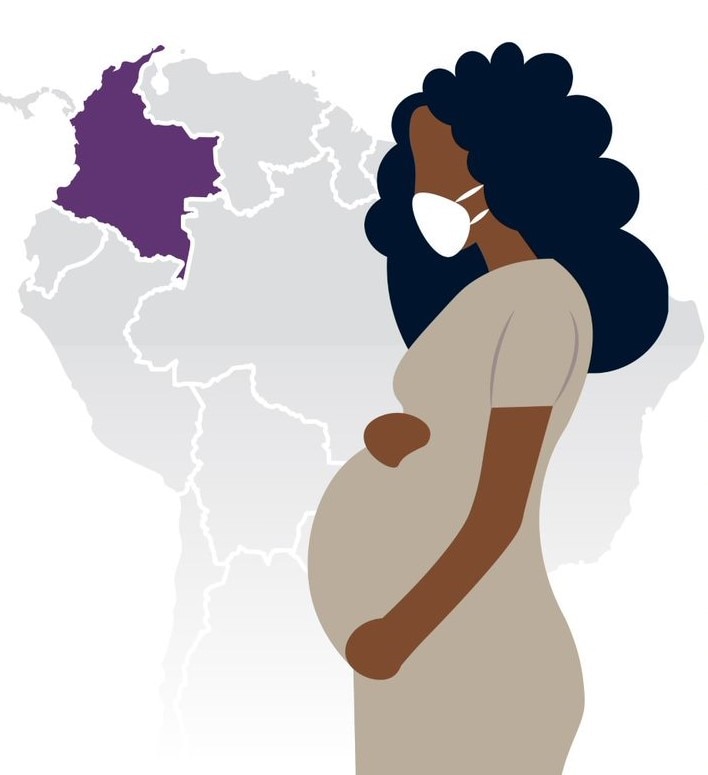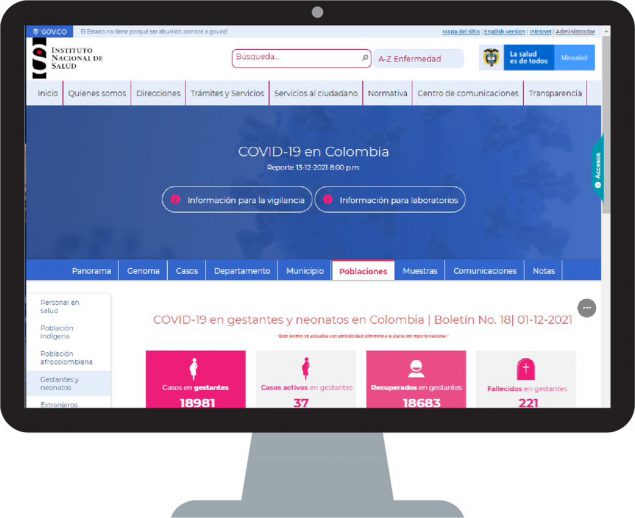Colombia Increases Surveillance to Protect Pregnant Women Against COVID-19
February 15, 2022

Throughout the COVID-19 pandemic, Colombia, like many other countries, has been challenged to rapidly identify and protect the most vulnerable groups from COVID-19. People with pre-existing health conditions, the elderly, and those with compromised immune systems were identified as being at greatest risk of severe illness and death. At the beginning of the pandemic in March 2020, the risks for pregnant women and their unborn babies were generally unknown. By improving COVID-19 surveillance for this population, Colombia’s National Public Health Institute (INSexternal icon) and members of the country’s Field Epidemiology Training Program (FETP) worked to address this gap.
For more than 100 years, the INS has demonstrated its increasing effectiveness in public health response both nationally and internationally. Through the 1992 launch of Colombia’s FETP to develop a workforce of disease detectives, CDC has collaborated with the INS to strengthen its emergency preparedness and response efforts, laboratory capacity, and use data to make decisions. With CDC’s continued support in strengthening the national public health surveillance system, the INS was able to quickly respond to this need for risk assessment of maternal and newborn health during this pandemic.
Members of the INS’s COVID-19 Risk Analysis Group (SAR) identified key questions about the COVID-19 risks for pregnant women, including
- Do COVID-19 infections endanger pregnancies?
- Could COVID-19 infections indirectly affect maternal health?
- What limitations exist in diagnosing pregnancy complications through virtual prenatal doctors’ visits?
In search of answers, the SAR worked with FETP Colombia residents, Grace Alejandra Ávila and Nathaly Rozo Gutiérrez, and FETP Colombia graduates, Franklyn Prieto and Maritza González, to collect and report on how COVID-19 infections were affecting maternal health across the country. Data were collected through Colombia’s national surveillance system in coordination with SAR.
“Our teams demonstrated how flexibility, adaptability, synchronization, and communication were essential to respond to the continuously changing needs of the COVID-19 pandemic.” – Dr. Maritza González, FETP Colombia coordinator
A public health surveillance system links laboratories and regional and national health departments to collect, review, and share data on specific diseases or health threats. Doing this successfully requires good communication and coordination between these groups, especially when there is a change in the surveillance system. For SAR, this meant accessing national laboratory databases and connecting with the national surveillance system to find information on pregnant women with confirmed or probable COVID-19. Linking and analyzing these data turned into a routine operation that is now reported online through a monthly bulletinexternal icon available to public health officials and the general public. The bulletin is updated regularly and includes a dashboard with a summary of infection and death counts of pregnant women by age group, region, and other factors.

INS bulletin on pregnant women and newborns with COVID-19 in Colombia
Studies on COVID-19 and maternal health find that pregnant women are at higher risk of severe illness and death. INS research using the SAR monthly bulletin data confirms this higher risk in the Colombian population. In 2021, COVID-19 was the leading cause of death in pregnant women in Colombia. The publication of this bulletin provoked the government to respond. In June 2021, the president of Colombia signed a decree to prioritize the vaccination of pregnant women and up to 40 days following childbirth, directly citing INS’s monthly bulletin. The impact of the pandemic on pregnant women and their babies, along with government policy response, highlights the importance of continued surveillance and reporting on this topic.
Effective communication and collaboration between different groups to improve public health surveillance strengthened the SAR project and increased awareness of how COVID-19 affects the health of pregnant women. The work of FETP graduates and residents in the INS’s real-time response to public health emergencies highlights the value of FETP in disease detection and response, and demonstrates the importance of a well-connected public health system during a public health crisis. Strengthening Colombia’s public health surveillance system helped the country better protect the lives of pregnant women and their unborn babies from the potentially devasting effects of COVID-19.